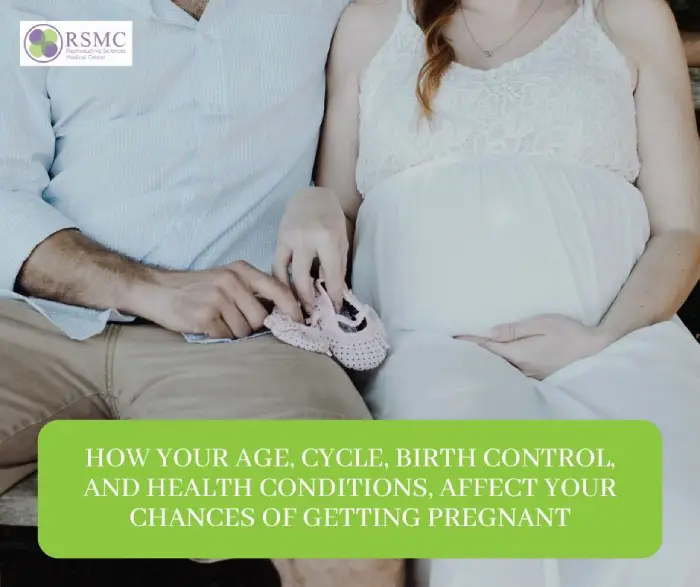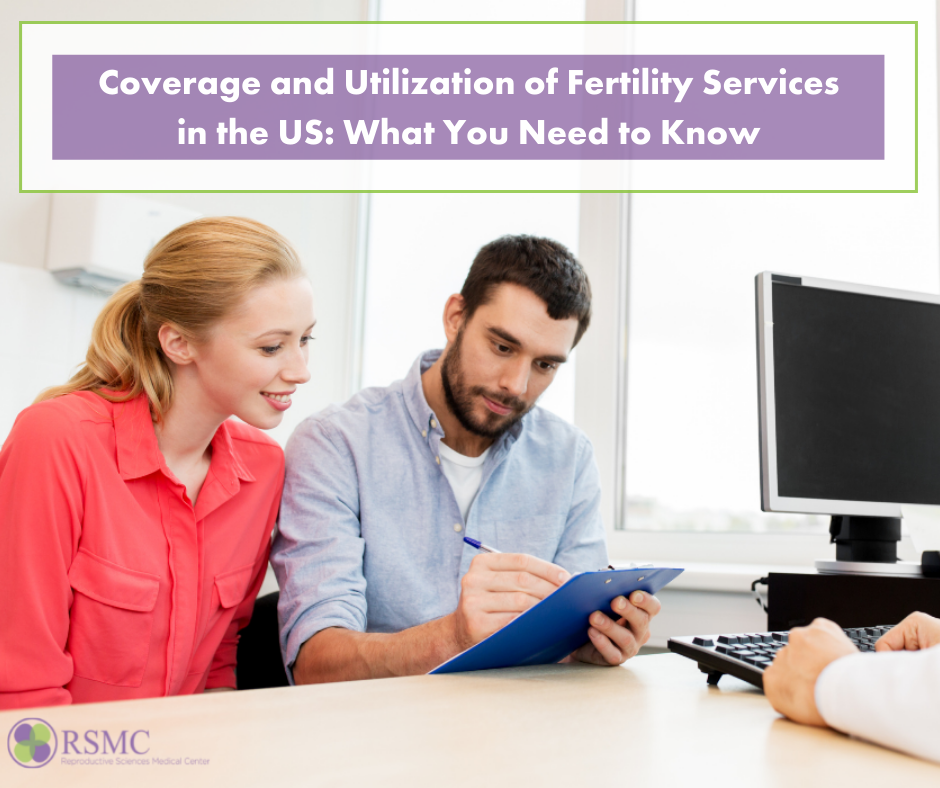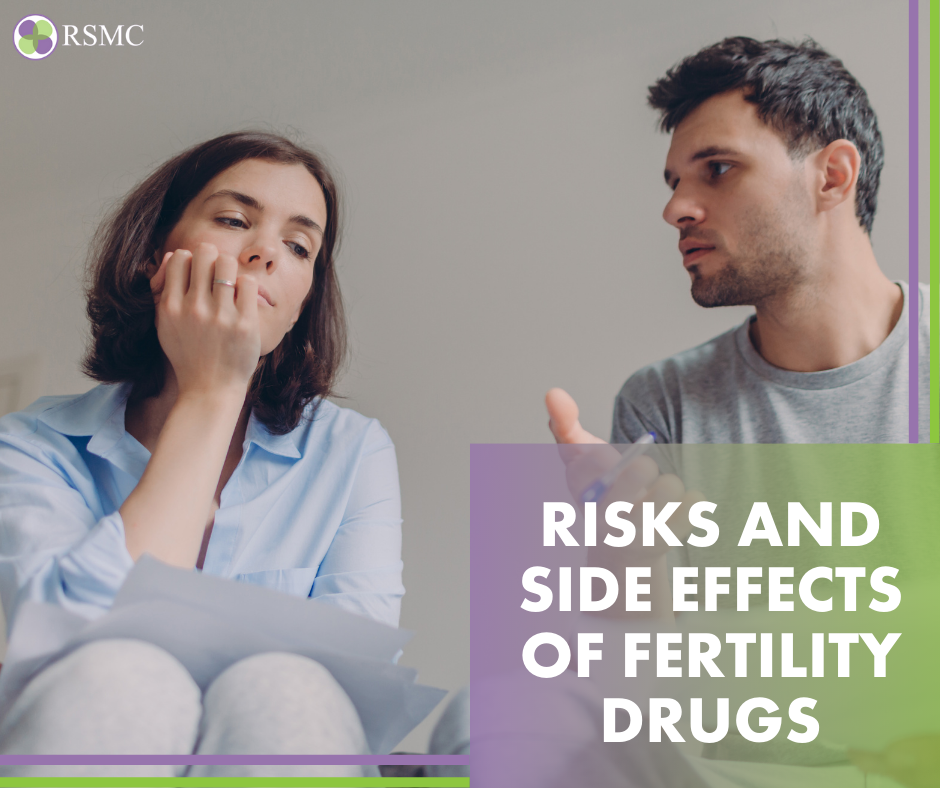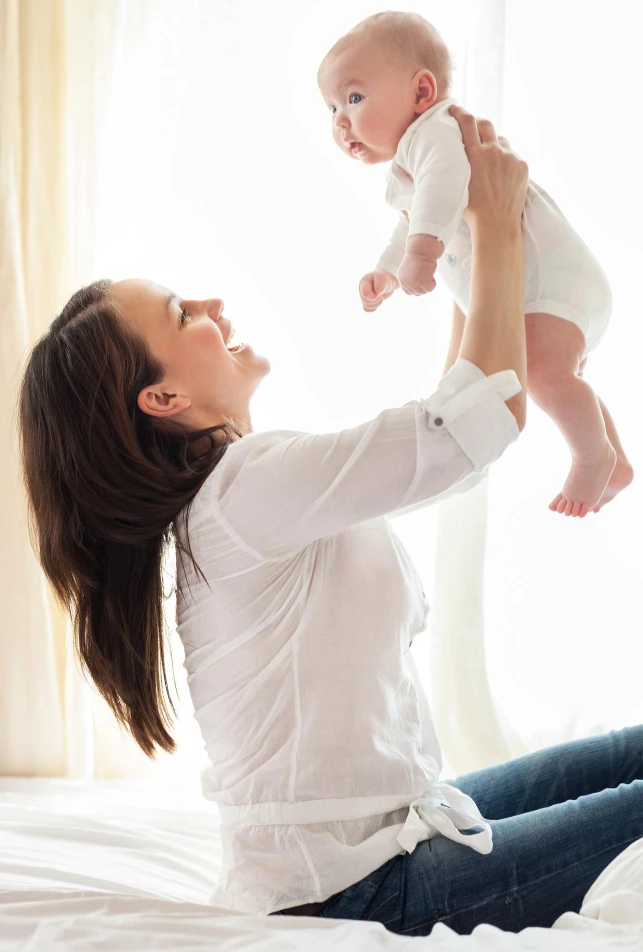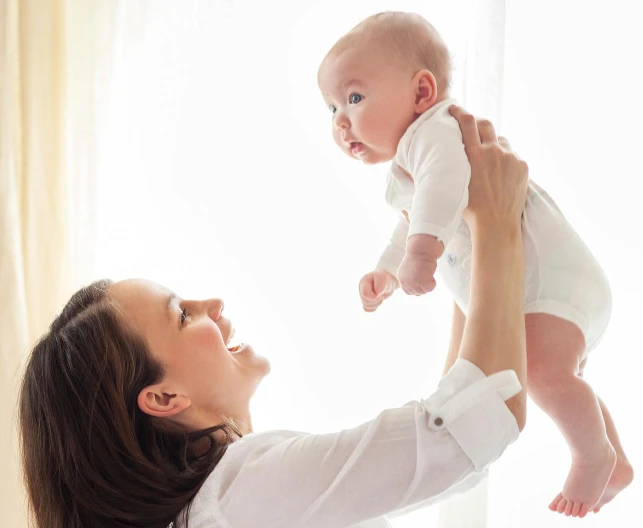In this comprehensive post from our fertility clinic, we are going to talk about the things that can affect your chances of getting pregnant such as your age, cycle, use of birth control, endometriosis, PCOS, and more. Let’s get started.
What is the conception?
There is more to conception than the love story of sperm meets eggs; eggs meet sperm that we are told in high school. Of course, sperm and eggs indeed need to meet for pregnancy to take place. However, it is a bit more complicated than that.
Women are born with all the eggs they are ever going to have (more than a million). They have about 400,000 eggs remaining by the time they reach the puberty stage. However, nearly all these eggs are in an undeveloped state. It is only in the months before ovulation that an immature egg develops into a viable egg that can be fertilized. During ovulation, the follicle releases only one egg. It takes approximately 30 hours for an egg to move from the ovary to the end of the fallopian tube. The egg then rests in the tube and waits for sperm for another 30 hours. If, after 24 hours, fertilization does not occur, the egg dies.
Fertilization still may occur.
However, if sperm enters into the reproductive tract and travels all the way to the egg, or if there’s any sperm waiting around the track before ovulation occurred, then fertilization may take place. Many medical experts agree that the fertilization of the egg doesn’t mean that conception has taken place. It takes a fertilized egg approximately 6 days to move down into the womb. Then, it implants (fertilized eggs attach to the uterus 6 to 10 days after conception in the uterine tube).
It is only then that the fertilized egg can begin to develop further. Also, here the eggs receive the necessary nutrients to lead to a pregnancy. Only around 40 percent of fertilized eggs will overcome this implanting-in-the-womb hurdle. It is only when that occurs that most medical experts would agree that conception has taken place.
What are your chances of conceiving naturally during your menstrual cycle without the help of a fertility clinic?
If you have a regular period and don’t suffer from any conditions that affect ovulation (e.g., PCOS, endometriosis), you can expect to ovulate in the middle of your menstrual cycle (days 10 to 14) in approximately 92-96 % of the cycles. However, ovulation does not occur in the remaining 4 to 6 % of cycles.
In a cycle where ovulation occurs, recent estimates indicate that the chances of conception are 42% the day preceding ovulation. The prospects become 3 % a week before ovulation occurs.
Sperm can survive up to 5 days in a woman’s reproductive tract. So it is possible to conceive if you have sex on those days before ovulation and not on the ovulation day itself. That is if those days overlap with the 24 hours that an egg can become fertilized.
Having sexual intercourse on the days before ovulation, although ovulation is yet to occur, raises the probability that sperm will be waiting for the egg following its release from the ovary. With that said, your chances of conceiving increase the closer you are to ovulation.
Outside the “reproductive window” (that is, 7 days before ovulation, the ovulation day, and the day following ovulation), it is physiologically impossible to get pregnant if you have regular-length periods and cycles. It implies that you cannot conceive during your period, nor can you do so a few days after ovulation. However, note that it is not every woman that ovulates on day 14 of the cycle. If your ovulation occurs on day 9 or 10, you can conceive from sexual intercourse you had on the 4th or 5th day of your period.
On average, how long does it take to conceive? When should you go to a fertility clinic?
According to a study, approximately 38 % of women who haven’t used birth control for a while will get pregnant within a month of trying to conceive (TTC). The ratio is 68 % within 3 months, 81 % within 6 months, and 92 % with a year. This implies that among TTC couples that couldn’t achieve pregnancy in the first 6 months, 50 % will get pregnant in the next 6 months. If couples have tried to get pregnant for over 12 months without success, it is recommended to get the help of a fertility clinic to see what may be the cause of it.
How does birth control affect the time it takes to get pregnant?
If you just stopped using or patches, then these numbers may vary based on what you were using. Researchers conducted a review of the existing work on how different birth control methods impacted the chances of conceiving within a year of trying. Below is what they found:
- 74.7 % for previous-implant users
- 77.74 % for previous-injectable users
- 87.04 % for previous-oral contraception users
- 84.75 % for previous-IUD users
The times to conception are similar among women who are using different oral contraceptives. It means that the type of birth control pills you are using does not affect how soon you are likely to conceive. The duration of oral contraceptive use may also not affect time-to-conception.
The takeaway: Women who are coming off of the popular methods of birth control experience no delay. However, those coming off of implant and injection-based methods can have a little delay. Also, the duration of birth control use does not affect how long it takes to conceive.
Is there a chance of getting pregnant if you are currently using birth control?
If you are currently on birth control, then the chances are that you are not trying to become pregnant. However, the effectiveness of your birth control method varies significantly depending on what you are using.
Spermicide is the least effective birth control method —according to the Centers for Disease Control and Prevention (CDC). 28 % of couples who only use this method will have an unplanned pregnancy within 12 months of typical use.
This number drops to 18 % over a period of one year for condoms. It further drops to 9 % for the pill, the ring, and the patch. A failure rate of 9 % may seem high for these hormone-based methods. But, it is good to note that this rate also considers errors on the user’s part. Remember that women don’t always use the pill as they should. Also, they don’t replace rings and patches when they are expected to. Due to this fact, the failure rates for hormone-based methods are much higher they would be when used perfectly.
Some contraception methods are much easier to use for women. For instance, if you use an IUD, you don’t have to do anything to make it work, except remembering to have it replaced when due. For these birth control methods, known as long-acting reversible contraceptives (LARCS), the failure rates are below 1 %.
How does age affect cycle-based conception rates and time-to-pregnancy? Can a Fertility Clinic help?
A woman’s fertility decreases as she gets older. The changes in her ability to get pregnant depend on how many female eggs are remaining and how healthy the eggs are. The changes in the quantity and quality of eggs make conception trickier as age increases.
According to a 2002 study, the chances of getting pregnant during the “reproductive window” reduces as age goes up. This study estimated the chance of conceiving at two days before ovulation to be approximately 50 % for women between the age of 19 to 26. It was below 30 % for those aged 35 to 39.
Time-to-pregnancy can also vary among women of different reproductive ages. It was estimated that nearly 45 % of women who are 25 or below might become pregnant after a cycle. Whereas the stat is approximately 20% for those above 35. Another study also estimated that 92 % of women between the ages of 19-26 would get pregnant after a year of trying. That number drops to 86 % for those between the ages of 27- 34. It goes even further (82 %) for women between the ages of 35 – 39. Having said that, your chances of getting pregnant change as you become older. Studies show that chances of getting pregnant after 40 naturally, start decreasing and often require the help of ART. It explains why older women usually take a longer time to conceive. This time can be accelerated with the help of a fertility clinic.
How do medical conditions affect my chances of conception?
Certain medical conditions may impact how frequently a woman ovulates and how likely her fertilized egg is to implant in the womb. It can also determine how likely she is to carry a pregnancy to full term. These conditions include endometriosis, PCOS, and thyroid conditions. Here are a few of them discussed by the specialists from our fertility clinic.
PCOS and conception
Short for the polycystic ovarian syndrome, PCOS is a medical condition that affects 1 in 10 American women. It is a leading cause of infertility in women seeking treatment at fertility clinics. Women with the condition usually have irregular, infrequent ovulation.
There are many research-backed options for women living with PCOS to raise their chances of getting pregnant. Clomid administration improves the chances of ovulation in patients with PCOS, as well as metformin. Keep in mind that women with polycystic ovarian syndrome are more likely to have adverse pregnancy outcomes. It means that they may have to visit the hospital more frequently when trying to conceive.
Endometriosis and conception
Endometriosis is another medical condition that affects women of childbearing ages. It is characterized by the growth of the endometrium outside of the womb. It might manifest as excessive bleeding, cramping, bloating, and headaches. There are a lot of controversies around the hypothesis that endometriosis results in infertility. However, studies have shown that the fertility hormone-based medications used in the treatment of the condition may not be suitable for women who are trying to get pregnant. These medications can disrupt the ability to conceive. In cases like these, assisted reproductive technology or surgery may be the best way to go.
Thyroid dysfunction and reproductive health
The hypothalamus-pituitary axis (HPA) controls the thyroid gland. When something occurs in one part of the HPA, it usually triggers a chain reaction in other parts. It means that when the levels of thyroid hormones are higher or lower, it can change our fertility hormones and disrupt our menstrual cycle, making it more difficult to get pregnant. Having a thyroid issue does not mean that you cannot conceive. However, you should resort to a fertility doctor or fertility clinic for consultation.
Prescription medications and conception
It is also possible that a medical condition might not impact ovulation or fertility, but medications for that condition do. For instance, there is no reason to think that a woman with musculoskeletal pain would have problems with ovulation. However, according to a recent study, the medication used in the treatment of such a condition – NSAIDs (nonsteroidal anti-inflammatory drugs) – can reduce progesterone levels and affect ovulation, making pregnancy difficult.
How can I increase my chances of natural conception?
This is a very important question. There are several factors that impact your chances of getting pregnant. Thus, there are many different things you may do to tip the balance in your favor. Here is some advice from our fertility clinic doctors.
One of the best things you can do to improve your chances is to monitor your menstrual cycles and schedule intercourse around ovulation. You have zero chances of conception if you are not having sex during your “reproductive window.” The odds of conceiving are high in the 5 days preceding ovulation and higher the day before ovulation. It is recommended that you have sexual intercourse within this window if you are trying to conceive.
There are ovulation prediction kits (OPKs) that you can use to know where in your cycle you are. These kits use hormones (to be specific, luteinizing hormone) to show whether you are ovulating or not. Also, you can utilize the so-called “symptom-thermal” method (STM) to pinpoint when your “reproductive window” begins and ends. Research has indicated that tracking cycles using symptoms can increase the odds of getting pregnant for women who have and have not had problems with conception.
Some lifestyle factors can impact how often you ovulate, how many eggs you have left, and your egg quality. This means that these factors may also influence how likely you are to become pregnant. For instance, having a very high or low body-fat percentage may make conception more difficult.
In summary
The number of factors affecting the chances of conception is so many that sometimes becoming pregnant may seem like a miracle. In short, here is what we know about your chances of getting pregnant:
- Keeping in mind that the amount of time it takes an egg for fertilization and how long sperm is able to survive in a woman’s reproductive tract, conception is only possible during a specific time of the menstrual cycle. The odds of getting pregnant increase the closer you get to ovulation.
- The chances of conception on each day of the cycle are different depending on your age. The younger you are, the higher are your chances. Due to this, time-to-conception also changes with age.
- There is no evidence that using birth control affects the chances of getting pregnant in the future. However, women who just stopped implants or injections have a little delay before conceiving.
- Some medical conditions, such as endometriosis or PCOS, can make conception a bit difficult. So, if you believe that you may have any of these conditions, you need to see a doctor or fertility clinic as soon as possible.
If you have any more questions about how your chances of conception are affected by age, your cycle, PCOS, endometriosis, or any other health conditions, please contact our fertility clinic, RSMC. Schedule a consultation where we can discuss your options for family building. You can reach us at (858) 436-7186 or visit us at www.Fertile.com.
Table of Contents
- What is the conception?
- What are your chances of conceiving naturally during your menstrual cycle without the help of a fertility clinic?
- On average, how long does it take to conceive? When should you go to a fertility clinic?
- How does birth control affect the time it takes to get pregnant?
- Is there a chance of getting pregnant if you are currently using birth control?
- How does age affect cycle-based conception rates and time-to-pregnancy? Can a Fertility Clinic help?
- How do medical conditions affect my chances of conception?

